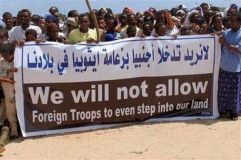Ethiopian incursion is a declaration of war – Somali Islamic official
Sept 25, 2006 (MOGADISHU) — Fears of regional conflict soared with the loss of a strategic port to Somalia’s radical Islamic militia, which faced angry demonstrations that erupted into deadly violence Monday, and for the first time acknowledged getting help from foreign Muslims.
 Ethiopian forces, meanwhile, arrived to support the internationally recognized government in its face-off with the radicals. Witnesses saw about 300 Ethiopians in a convoy of 50 armored trucks in Bardaale, 60 kilometers (40 miles) west of Baidoa, the only town held by the weak government. Islamic forces believe Ethiopian troops aim to cut off their route between Kismayo and Mogadishu.
Ethiopian forces, meanwhile, arrived to support the internationally recognized government in its face-off with the radicals. Witnesses saw about 300 Ethiopians in a convoy of 50 armored trucks in Bardaale, 60 kilometers (40 miles) west of Baidoa, the only town held by the weak government. Islamic forces believe Ethiopian troops aim to cut off their route between Kismayo and Mogadishu.
“The incursion of Ethiopian troops into Somali territories is a declaration of war on Somalia,” Sheik Yusuf Indahaadde, national security chairman for the Islamic group, told The Associated Press by telephone from Mogadishu. “We call on the international community to urge Ethiopia to withdraw its troops from Somalia. If that doesn’t happen the consequences of insecurity created by Ethiopia will spread to neighboring countries and to East Africa as a whole.”
As it has established authority in the capital and across much of the south starting in June, the Islamic group’s strict interpretation of Islam has sparked comparisons with Afghanistan’s Taliban. The United States has accused the Islamic group of sheltering suspects in the 1998 al-Qaida bombings of U.S. embassies in Kenya and Tanzania. Al-Qaida chief Osama bin Laden has portrayed Somalia as a battleground in his war on the U.S.
Several thousand demonstrators protested against the Islamic militia Monday in Kismayo, 420 kilometers (260 miles) southwest of the capital, Mogadishu. The militia seized Kismayo, one of the last remaining ports outside their control and Somalia’s third largest town, a day earlier without a fight.
Islamic militiamen with white bands on their heads opened fire on the protesters. Kismayo resident Abdiqadir Filibin said he saw the 13-year-old killed. Two other children were injured, witnesses said on condition of anonymity for fear of reprisals. Sporadic gunfire could also be heard in other parts of the town.
“They are … al-Qaida and we do not want them,” said Halimo Mohamed, one of the protesters in Kismayo. “Theirs is not a religion. They are terrorists.”
But some Somalis have welcomed the order the Islamic group has brought to a country where the transitional government has struggled to assert authority since if was formed in 2004 and where there has been no effective national government since 1991, when warlords overthrew dictator Mohamed Siad Barre and then turned on one another, throwing the country into anarchy.
Hassan Turki, leader of the Islamic militia, told a demonstration in support of his group in Kismayo earlier Monday that foreign fighters were helping his fighters.
“They are your brothers in Islam,” Turki said.
Turki, who is rarely seen in public, is on the U.S. and U.N. lists of suspected terrorists for having alleged ties to al-Qaida.
In an interview with the AP Monday, Somali Prime Minister Ali Mohamed Gedi said “terrorists” dominate the Islamic group.
Gedi, speaking in neighboring Kenya, called on the U.N. to partially lift an arms embargo to allow for the deployment of African peacekeepers, a move the radicals oppose.
The African Union has endorsed a plan by eastern African states to deploy peacekeepers in Somalia to protect Gedi’s weak, internationally recognized government.
The U.N. Security Council was expected to meet in New York Monday to discuss a partial lifting of the embargo.
The Islamic group and Gedi’s government have agreed to a cease-fire, but the Islamic fighters have continued to advance across the country. Gedi accused the Islamic group of violating the nonaggression agreement.
Gedi would not comment on reports of Ethiopian troops entering Somalia, but did say he expected neighboring countries to protect his government.
Witnesses had reported several deployments of Ethiopian troops in support of the government in recent months, and U.N. officials have confirmed the presence of a small number of Ethiopian troops around the town of Baidoa, saying the force was intended to defend the government and Ethiopian interests in Somalia. But Ethiopian and Somali officials have repeatedly denied any Ethiopian troops have crossed the border into the country.
Ethiopia on Monday repeated earlier denials its troops were in Somalia.
“No Ethiopian troops have crossed the border into Somalia,” foreign affairs spokesman Solomon Abebe told The Associated Press. The Islamic group “violated the peace agreement by occupying the port city of Kismayo. Anytime the (Islamic group) takes a wrong step, it is well known that they use Ethiopia to hide their mistakes.”
A Western diplomat said last week that following an assassination attempt against Somali President Abdullahi Yusuf, Ethiopia offered to send a battalion of troops to Somalia to protect the U.N.-backed government.
The Islamic group has been able to use Somalis’ long-standing suspicions about Ethiopia to fan opposition to the government. Ethiopia and Somalia fought a war in 1977 to 1978 and view each other as enemies, but Yusuf is a longtime ally of Ethiopia.
(AP/ST)
